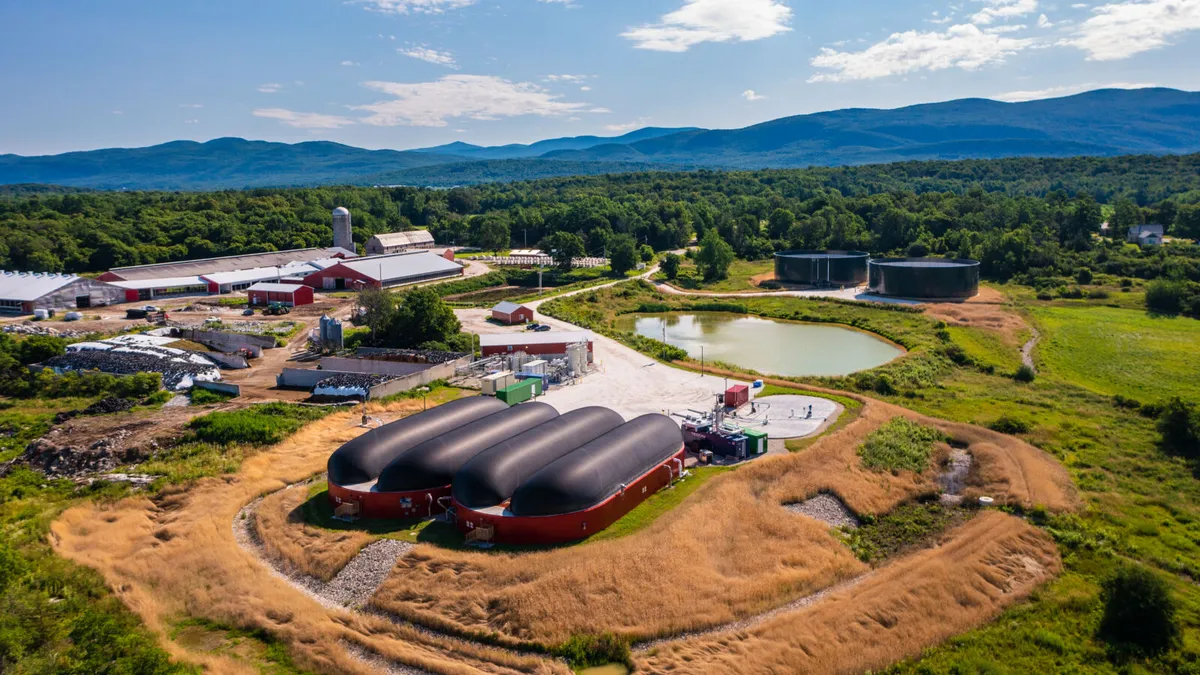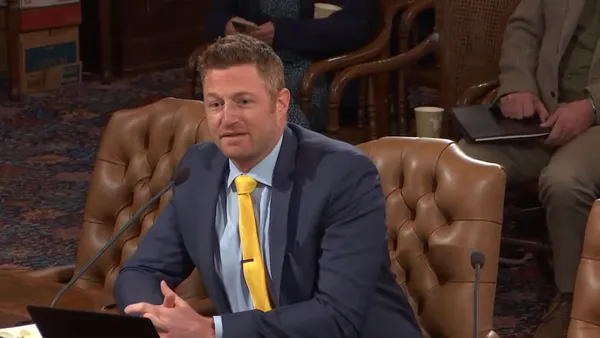Dive Brief:
- Vanguard Renewables announced an agreement with AstraZeneca on Tuesday to supply RNG for the pharmaceutical company's U.S. operations. AstraZeneca began purchasing renewable natural gas from Vanguard on June 1 for its Newark, Delaware, campus, and by 2026 could acquire 650,000 mmBtus of energy annually.
- The business-to-business agreement on the voluntary market is Vanguard's largest to date and will involve three of its farm-based anaerobic digesters. The company has been working to scale up its on-farm digestion capacity after it was acquired by BlackRock for roughly $700 million last year.
- AstraZeneca has set a target to be “science-based net zero” emissions by 2045, according to the release, which Vanguard Renewables CEO Neil Smith called an “ambitious and challenging” goal. “We strongly believe this partnership will provide a path for other like-minded companies to join us on the journey towards global decarbonization,” Smith said in a statement.
Dive Insight:
The 15-year agreement is one of the largest ever RNG purchases on the voluntary market in North America, said Sam Lehr, manager of sustainability and markets policy at the Coalition for Renewable Natural Gas.
"In terms of your traditional sort of corporate working to meet a greenhouse gas reduction goal, this is the first big RNG purchase that we've seen," Lehr said.
John Hanselman, founder and chief strategy officer at Vanguard, said in an interview the AstraZeneca agreement was “the largest renewable natural gas offtake agreement” in the country that he was aware of. It spans seven AstraZeneca facilities and includes about 650 million cubic feet of RNG, plus the option for AstraZeneca to take an additional 300 million cubic feet of RNG per year.
The agreement, at full capacity, would supply energy equivalent to heating 17,800 U.S. homes for a year, according to the release. It would also make a sizable dent in AstraZeneca's Scope 1 emissions, which the company hopes to reduce 98% from a 2015 baseline by 2026 — so far, it’s reduced Scope 1 and 2 emissions 59.3%, per its most recent sustainability report. Because Vanguard's refined biogas is created from waste that would otherwise emit methane into the atmosphere, it's considered carbon negative.
Lehr said there is a growing group of multinational companies, especially manufacturers, that have been working to reduce their greenhouse gas emissions and are struggling to tackle hard-to-decarbonize processes that rely on fossil fuel-derived methane. The RNG Coalition and others tout RNG as an accessible means to reduce those emissions.
"The reality is, for companies that have natural gas demands and who have near-term climate goals, RNG is really the only option for that," Lehr said. "AstraZeneca is one of those companies, and they're really the first major one to take that step."
Vanguard is not the only organics recycling company looking to secure partnerships for its biogas on the open market. Anaergia revealed in its first quarter earnings presentation that it's supplying RNG to Toyota for operations at its Long Beach, California, port facility. It's also selling RNG to Canada's largest oil refinery, Irving Oil, via a Rhode Island asset.
The public sector has also gotten involved. In 2020, the University of California system entered into an agreement with Archaea Energy, now a division of BP, to develop a biomethane facility in San Bernardino County. The project would reportedly generate 900,000 mmBtus of RNG, half of which would go to the UC system under the terms of a 15-year agreement.
The market for RNG offtake agreements is set to expand, as Vanguard and others bring more projects online. Hanselman said his company has about 130 co-digesters and anaerobic digestion systems in some stage of development, and Vanguard is looking to sell most of its RNG through long-term agreements to lock in financial stability.
“This represents a fraction of what we think we’ll sell,” Hanselman said. “We are hopeful that this is the first of many industry players who will really commit to decarbonization and replace their fossil [fuels] with renewable natural gas.”















